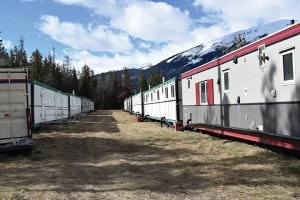
News that Parks Canada was building a temporary “work camp” to house some of its staff this summer caught a lot of people by surprise, especially the business community.
For years businesses have been pushing the powers that be, including Parks Canada and the municipality, to come up with a solution to help ease Jasper’s housing crisis.
So it was no surprise that businesses were shocked to see Parks Canada unilaterally resolve its own housing shortage by plopping down nine “temporary” trailers in the old woodlot across from Old Fort Point Road.
According to Parks Canada, the trailers will provide housing for 36 staff this summer, presumably because Parks had nowhere else to put them.
While new housing is a welcome development in a community that has a zero vacancy rate, the speed at which Parks Canada was able to resolve its housing shortage left a lot of people wondering whether there are two sets of rules when it comes to development in Jasper National Park.
On one hand, businesses and residents often have to jump through hoops of bureaucratic red tape for even the smallest improvements to their property, while on the other hand Parks Canada, which controls land use and development, somehow managed to expedite the process.
Parks Canada claims the approval process for it to build the temporary work camp was the same as it would be for anyone else, but if that’s the case how did it manage to build accommodations so quickly and why was it able to build outside of the townsite’s boundaries?
Experience tells us that if a commercial operator had asked to do the same, the proposal would have either taken years to come to fruition or it would have been rejected on the grounds that no new overnight commercial accommodations can be built outside of the community, just as the park’s management plan stipulates.
If Parks Canada is playing by the same rules it would seem to suggest that the public has either been interpreting the management plan wrong this entire time or building overnight accommodations outside the townsite is fair game so long as it’s for staff and not guests.
If this is indeed the case, Parks Canada should expect similar proposals to come forward in future – after all it’s the one that’s supposed to lead by example.
Then again, maybe that’s not how Parks Canada wants the public to interpret its rules and regulations and instead what we have here is a classic case of “do as I say, not as I do.”
